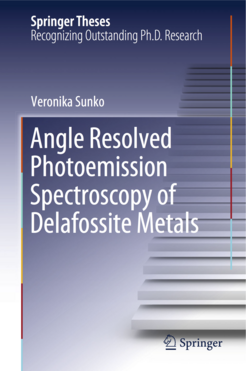Springer Thesis Prize for Veronika Sunko
We are delighted to announce that Veronika Sunko’s superb PhD thesis research has been recognized by the award of a Springer Thesis Prize. The award consists of a cash prize and, more importantly, the publication of her thesis as a book by Springer Nature: https://link.springer.com/book/10.1007/978-3-030-31087-5 .
For her doctoral research, Veronika concentrated on angle resolved photoemission measurements of surface and bulk states in a special class of layered triangular lattice metals from the delafossite family. These remarkable metals have some of the highest conductivities of any known materials, and the initial plan was for Veronika to perform spectroscopic investigations into the reasons that they conduct so well. She duly achieved insights into the high conductivity, but her experiments also revealed some completely unexpected signals from both bulk and surface states. Using a combination of experiment and theory, sometimes working alone and sometimes in collaboration, she solved the puzzles that her observations had presented. In doing so, she provided entirely new perspectives that rewrite the received wisdom of two mature fields of research.
Her supervisors, Andy Mackenzie of the Physics of Quantum Materials department and Phil King of the University of St Andrews, express their opinion of the quality of her work in the book’s foreword, a section of which reads ‘Veronika’s research is characterized by intellectual brilliance and deep physical insight, combined with infectious enthusiasm and a determination to solve any problem that she faces. This doctoral thesis is an absolutely outstanding piece of scientific writing, and Veronika’s special combination of scientific creativity and originality shine out in each chapter. In an era in which experimental and theoretical physics are becoming ever more widely separated, Veronika makes little distinction between the two disciplines. For her, it is all just physics; her work is driven by experimental discovery, but she is not content to let someone else find out and explain what those discoveries mean. In the thesis, she describes at least twice as much new and important work as one would typically expect to find in a leading PhD dissertation, and she only had space to write about approximately half of her research achievements from the past four years!’
We offer our warm congratulations to Veronika for this timely recognition of her outstanding achievements.
Andrew Mackenzie / APM

